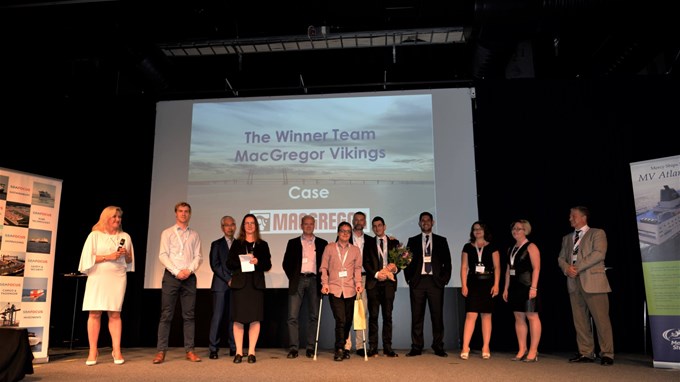Co-creation projects pioneer industry advances
26 11月 2018 阅读时间 计算文字
By working together with industry and academia, MacGregor is shifting the way that it develops products and services for customers, ensuring that they reap the benefits
Through alliances, partnerships, joint working agreements and informal collaborations, MacGregor is continuing its commitment to transforming the maritime transportation industry and advancing what it can offer customers.
The industry landscape is changing so fast that stakeholders must work together to innovate, test ideas, and ultimately plug innovation gaps with products and services that were previously unavailable, or substantially improve existing ones.
“We have multiple ongoing collaborative projects,” says Magnus Sjöberg, Senior Vice President, Cargo Handling, MacGregor. “We encourage knowledge sharing inside our organisation and actively build relationships with universities so that together we can identify interesting areas for innovation to bring value to our customers and other stakeholders.”
Accelerating industry advances
A recently-announced collaborative project is the Finland-Singapore Maritime Innovation camp, designed to accelerate innovative developments within the maritime industry. It will take place towards the end of 2018 in Singapore.
During the event, challenges will be presented to students by academic partners, the University of Turku (UTU) and the Singapore Maritime Institute (SMI) and corporate partners, MacGregor and the PSA Corporation.
“Research collaboration is important because of the wider perspectives it provides,” says Janne Suominen, Manager, Offering Development, MacGregor Cargo Handling. “In our daily operations we tend to be focused on technical details, while students can consider a wider, more general, cross-industrial view without limitations in their ideas.
“The benefit for universities and students is the possibility to test theories on real life engineering challenges. Universities are able to facilitate circumstances where new ideas can be created and new questions can be generated, potentially leading to new opportunities,” Mr Suominen notes.
Automation on the agenda
Automation was an important component at a start-up event called ‘The Shift’, which brought together growth companies, start-up influencers and corporate stakeholders in Turku, Finland, earlier this year. Alongside Rolls-Royce and DNV GL, MacGregor hosted a round-table discussion about the expanding role that artificial intelligence plays in the industry.
In his keynote address, Roni Jukakoski, Director, Customer Innovations of Cargo Handling, MacGregor, raised the topic of minimising industry waste through the development of autonomous shipping and the expanding role of artificial intelligence. He invited innovators to collaborate with MacGregor, emphasising the importance of starting with the cargo profile when considering new ship designs. “We put cargo first and build the system around it,” he says. “We do not sacrifice flexibility in this approach; rather we maximise efficiency.”
On the hunt for intelligence
MacGregor has developed a unique new system for improving port and voyage efficiency for RoRo vessels. Participating at this year’s SeaFocus #intelligence hunt3 awards, two teams were asked to collaborate and create a solution that would extend the scope and accuracy of this new MacGregor system.
The ‘hunt’ proved to be an ideal way for MacGregor and its experts to innovate and provide guidance for the MacGregor challenge. It involved developing a system that will enable precise tracking and cargo identification on board RoRo vessels, taking into account the constraints of large RoRo ships and their complex cargo operations.
MacGregor believes that a new cargo tracking system would be a valuable tool for shipping lines, replacing the long-obsolete systems in place today. Amongst many benefits, it would deliver accurate productivity measurements, automatic tallies and stowage plans, match the correct cargo to the correct vessel, and optimise the use of space.
The team working with MacGregor challenge, called the MacGregor Vikings, won this year’s hunt. It consisted of students from Åbo Akademi Turku, Finland, the University of Strathclyde, Glasgow, Scotland and Tampere University of Technology, Finland.
Adding value, improving safety
Adding value to a product or service is extremely important, particularly in today’s financial climate; improving safety is of equal concern. An important ongoing collaboration project, which addresses both of these issues in the offshore sector, involves the Norwegian University of Science and Technology (NTNU) and the Foundation for Scientific and Industrial Research (SINTEF).
The four-year LifeMoor project, funded by the Research Council of Norway (RCN) and run by SINTEF, is designed to address the underlying causes of mooring system failures. It also aims to improve the integrity of mooring chains, facilitate the development of monitoring systems to assess the state of mooring system mechanisms, and expand industry knowledge about the effects of degradation and fatigue.
Mooring line failures can have catastrophic consequences, but operators are understandably hesitant when it comes to replacing them because of high costs and potential production downtime. The wide-ranging factors that contribute to their failure also make it difficult to assess the condition of system components.
In addition to more reliable and cost-efficient mooring systems, MacGregor also expects that LifeMoor will offer better service life estimates on mooring chains, delivering a significant benefit to operators.